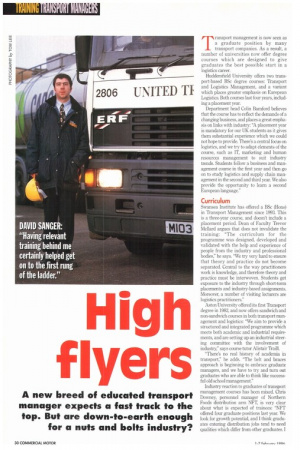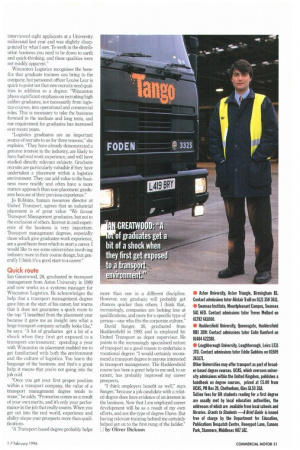High flyers
Page 32

Page 33

If you've noticed an error in this article please click here to report it so we can fix it.
A new breed of educated transport manager expects a fast track to the top. But are down-to-earth enough for a nuts and bolts industry?
Transport management is now seen as a graduate position by many transport companies. As a, result, a number of universities now offer degree courses which are designed to give graduates the best possible start in a logistics career.
Huddersfield University offers two transport-based BSc degree courses: Transport and Logistics Management, and a variant which places greater emphasis on European Logistics Both courses last four years, including a placement year.
Department head Cohn Bamford believes that the course has to reflect the demands of a changing business, and places a great emphasis on links with industry: "A placement year is mandatory for our UK students as it gives them substantial experience which we could not hope to provide. There's a central focus on logistics, and we try to adapt elements of the course, such as IT, marketing and human resources management to suit industry trends. Students follow a business and management course in the first year and then go on to study logistics and supply chain management in the second and third year. We also provide the opportunity to learn a second European language."
Curriculum
Swansea Institute has offered a BSc (lions) in Transport Management since 1993. This is a three-year course, and doesn't include a placement period. Dean of Faculty Trevor Mellard argues that does not invalidate the training: "The curriculum for the programme was designed, developed and validated with the help and experience of people from the industry and professional bodies," he says. "We try very hard to ensure that theory and practice do not become separated. Central to the way practitioners work is knowledge, and therefore theory and practice must be interwoven. Students get exposure to the industry through short-term placements and industry-based assignments. Moreover, a number of visiting lecturers are logistics practitioners."
Aston University offered its first Transport degree in 1982, and now offers sandwich and non-sandwich courses in both transport management and logistics: "We aim to provide a structured and integrated programme which meets both academic and industrial requirements, and are setting up an industrial steering committee with the involvement of industry," says course tutor Alistair Traill.
"There's no real history of academia in transport," be adds. "The belt and braces approach is beginning to embrace graduate managers, and we have to try and turn out graduates who are able to think like successful old school management."
Industry reaction to graduates of transport management courses has been mixed, Chris Downey, personnel manager of Northern Foods distribution arm NFT, is very clear about what is expected of trainees: "NFT offered four graduate positions last year. We look for growth potential, and I think graduates entering distribution jobs tend to need qualities which differ from other graduates. I interviewed eight applicants at a University milkround last year and was slightly disappointed by what I saw. To work in the distribution business you need to be down to earth and quick-thinking, and these qualities were not readily apparent."
Wincanton Logistics recognises the benefits that graduate trainees can bring to the company, but personnel officer Louise Lear is quick to point out that new recruits need qualities in addition to a degree; "Wincanton places significant emphasis on recruiting high calibre graduates, not necessarily from logistics courses, into operational and commercial roles. This is necessary to take the business forward in the medium and long term, and our requirement for graduates has increased over recent years.
"Logistics graduates are an important source of recruits to us for three reasons," she explains. "They have already demonstrated a genuine interest in the industry, are likely to have had real work experience, and will have studied directly relevant subjects. Graduate recruits are particularly valuable if they have undertaken a placement within a logistics environment. They can add value to the business more readily and often have a more mature approach than non-placement graduates because of their previous experience."
Jo Robbins, human resources director at United Transport, agrees that an industrial placement is of great value: "We favour Transport Management graduates, but not to the exclusion of others. Interest in and experience of the business is very important. Transport management degrees, especially those which give graduates work experience, are a good basis from which to start a career. I would like to see some universities involving industry more in their course design, but generally I think it's a good start to a career."
Quick route
Ian Greatwood, 28, graduated in transport management from Aston University in 1989 and now works as a systems manager for Wincanton Logistics. He acknowledges the help that a transport management degree gave him at the start of his career, but warns that it does not guarantee a quick route to the top: "I benefited from the placement year because it gave me an insight into what a large transport company actually looks like," he says. "A lot of graduates get a bit of a shock when they first get exposed to a transport environment; spending a year with Wincanton on placement enabled me to get familiarised with both the environment and the culture of logistics. You learn the language of the business, and that's a great help; it means that you're not going into the job cold.
"Once you get your first proper position within a transport company, the value of a transport management degree tends to wane," he adds. "Promotion comes as a result of your own merits, and it's only your performance in the job that really counts. When you get out into the real world, experience and ability shape your prospects more than qualifications.
"A Transport-based degree probably helps more than one in a different discipline. However, any graduate will probably get chances quicker than others. I think that, increasingly, companies are looking less at qualifications, and more for a specific type of person—one who fits the corporate culture."
David Sanger, 26, graduated from Huddersfield in 1993 and is employed by United Transport as depot supervisor. He points to the increasingly specialised nature of transport as a good reason to undertake a vocational degree: "I would certainly recommend a transport degree to anyone interested in transport management. The Huddersfield course has been a great help to me and, to an extent, has probably improved my career prospects.
"I think employers benefit as well," says Sanger, "because a job candidate with a related degree does have evidence of an interest in the business. Now that I am employed career development will be as a result of my own efforts, and not the type of degree I have. But having relevant training behind me certainly helped get on to the first rung of the ladder." Li by Oliver Dickson
































































































